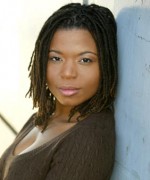Column Name
Title
As an acting student at Columbia, Katori Hall felt that there weren’t enough roles being written for African-American women between 18 and 25. “But instead of complaining about not fitting into other playwrights’ worlds, I decided to do something about it,” the 2009 graduate of the Playwrights program said. One of the pieces she brought with her to Juilliard was the beginnings of a play about the last night of Martin Luther King’s life. It was inspired by Hall’s mother’s stories about how her own mother, worried about violence, cautioned her not to attend what would be King’s last speech, on April 3, 1968. In the play, called The Mountaintop, the exhausted activist is visited in his hotel room by a hotel maid with a mysterious secret, and they spend the evening conversing. In a star-studded trajectory,The Mountaintop was awarded London’s prestigious best new play Olivier in March 2010. The Mountaintop opens in previews at the Bernard B. Jacobs Theater on Broadway on September 22, starring Samuel L. Jackson and Angela Bassett. Hall recently took time from the whirlwind of preparations to talk to Journal editor Susan Jackson.
Body
When did you start writing The Mountaintop?
Because the story was told to me so many times in my life, in a weird way, I’ve been writing it my whole life. I’m a story collector: I hear a story, and I keep it in my arsenal. It will work on itself in me until it needs to leap out onto the page. Early 2007 was when I decided that I was going to put this story to paper. I wrote the first eight pages then and didn’t touch it ’til fall.
What triggered your writing of it?
It was partly that the 40-year marker of Dr. King’s assassination was coming up. And also that this man Obama was interested in becoming president. At that moment in my life and America’s history, I was putting a lot of things together and questioning how far we had come as a nation since King’s death—and how much we still needed to do. The moment [of the anniversary] prompted me to finally sit down at the computer and really write that story.
How was The Mountaintop’s development connected with Juilliard?
[Playwright program directors Marsha Norman and Christopher Durang] were so supportive, and my classmates’ feedback was really important to how I approached the rewrites. From Juilliard I got a more academic perspective, and Lark Play Development Center, where I was in a playwrights workshop at the same time, gave me a more audience-based perspective. Those two different processes going on at the same time make the play what it is today.
Did anything surprise you about your Juilliard experience?
What I loved the most was having the opportunity to work with amazing young, vibrant, hungry actors. It’s very rare that a playwright has the opportunity to see their work instantly coming out of an actor’s mouth. I was also pleasantly surprised by the fact that there were a lot of African-American actors, which is an amazing sign of progress, a sign that there are many African-American actors deserving of complex and interesting roles.
The current Playwrights Festival at Juilliard takes place September 8-11; tell us about your experience with it.
It’s such a wonderful process. You get to pick the director, work with really talented actors, be at all the rehearsals, and generally help bring your play to fruition. It really preps you for life outside school. It also helps you learn how to let go, which you have to do as a playwright: you have to learn to walk out of the rehearsal room and know that it will be O.K.—and that gives the actors a sense of confidence.
You’ve been very involved in the pre-production of the Broadway Mountaintop; how do you shift gears from the solitary writer’s life to the crazy theater life?
Even while I’m writing, I’m always in the midst of it. I always have people around, and I’m doing readings and meeting with creative advisors. But yeah, you toil at your computer/writing desk, and all of a sudden, it’s in front of a breathing audience and they’re laughing or crying. That’s a bigger version of letting go, and eventually you have to deal with it. And part of that is seeing the audience relate to the story and hoping that they’re being changed by it.
How do you hope they will be changed by it?
I wanted to depict not only Dr. King’s triumphs but also his struggles. He achieves such great things, but he is grounded in a very human existence. My hope is the audience will be inspired by his greatness, but that they’ll also realize that he is for regular people. I want the audience to come out saying, “I can be a King, too. We all can be Kings.”
How have you been changed by it?
I’ve learned so much more about Dr. King and the history of civil rights and came out so inspired. I didn’t know he spoke out against Vietnam. I didn’t know he was speaking out about poor people and militarism and foreign policy. It was way more complicated than just the “I Have a Dream” King in our textbooks.
How has this experience changed your playwriting?
I’ve gotten more fearless in terms of how I write and what I write about. To many people, [The Mountaintop] is almost blasphemous: How dare you take King off a pedestal? I say, How dare I not? I’m a dramatist. I’m supposed to put human beings on stage. People are people. People bleed. People die. People are afraid. My purpose is to tell stories that wouldn’t necessarily be told.





